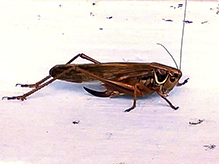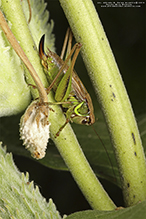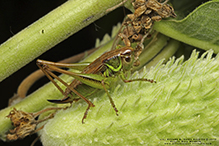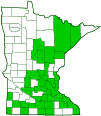Roesel’s katydid
(Roeseliana roeselii)
Conservation • Description • Habitat • Ecology • Distribution • Taxonomy
Conservation Status |
|
|||||||
| IUCN Red List | not listed |
|||||||
| NatureServe | not listed |
|||||||
| Minnesota | not listed |
|||||||
Description |
||
Roesel’s katydid is a small, short-winged, shield-backed katydid. It is native to Europe, where it is called Roesel’s bush-cricket. In 1953 it was reported at two locations in Quebec. These were the first North American records. It has spread and now occurs in southern Canada from Prince Edward Island to Manitoba, and in the northern United States from Maine to Minnesota south to Maryland and Iowa. Adults are found from late June through October in meadows and grassy fields, at the margins of pastures, and in ditches and roadsides. They require a moist area with tall grasses that is undisturbed by mowing or grazing. Adults are ½″ to 1″ (13 to 26 mm) in length. They are usually dark brown, sometimes yellow. They are rarely completely green but are often tinged with green. The face is vertical. The antennae are thread-like and long, as long or longer than the body. They are attached high on the face and far apart. The antennae bases are closer to the compound eyes than to each other. On each side of the head there is a black patch that wraps above and behind the compound eye. The patch s split above the eye by a cream-colored line. The exoskeletal plate covering the first segment of the thorax (pronotum) is brown on top, black with brown mottling on the sides. There is a broad, cream-colored line around the margins of each side (lateral lobe). There are three pale green or yellow spots on each side of the thorax. The abdomen is mostly dark brown. The leathery front wings (tegmina) are elongated-oval. They are held roof-like over the body. A small area at the base of the tegmen is horizontal and very dark. On the male, this is the stridulatory field. There is a row of bumps (a file) on the underside of the tegmen and a sharp edge (blade) on the upper side of the lower wing. By rubbing the file against the blade, the male produces its distinctive song. The female tegmina are similar but do not have these two sound-producing structures. On most adults the lower wings are reduced, shorter than the body, and not functional. These adults are flightless. A very small number of adults, less than 1%, have long, functional wings. More winged adults occur following a hot summer. The wings, when present, are membranous, broad, and longer than the body. On the female the ovipositor is shorter than the abdomen, flattened, curved upward. The front legs are short, the middle legs a little longer, the hind legs much longer. The third segment (femur) of the front leg has one or more spines on the upper side. The end section of the leg (tarsus), corresponding to the foot, has four segments. |
||
Size |
||
Total length: ½″ to 1″ (13 to 26 mm) |
||
Song |
||
Similar Species |
||
Habitat |
||
Meadows, grassy fields, edges of pastures, ditches, and roadsides |
||
Ecology |
||
Season |
||
One generation per year: Late June through October |
||
Behavior |
||
|
||
Life Cycle |
||
The female deposits eggs on a blade of grass. She may also pierce the stem of a forb or shrub with her ovipositor and insert an egg into the stem. The eggs overwinter and nymphs emerge in late May and June. |
||
Nymph Food |
||
Plant juices |
||
Adult Food |
||
Mostly grasses, but also other plants and small insects |
||
Distribution |
||||
|
Sources |
|||
| 7/6/2023 | ||||
Occurrence |
||||
Becoming increasingly common |
||||
Taxonomy |
|||
Order |
Orthoptera (Grasshoppers, Crickets, and Katydids) | ||
Suborder |
Ensifera (katydids, crickets, and allies) | ||
| Infraorder | Tettigoniidea (katydids, wētā, and allies) | ||
Superfamily |
Tettigonioidea | ||
Family |
Tettigoniidae (katydids) | ||
Subfamily |
Tettigoniinae (shieldback katydids) | ||
| Tribe | Platycleidini | ||
Genus |
Roeseliana | ||
Some authors (BugGuide.net) list this as Metrioptera roeselii. Until recently the genus Roeseliana and almost all of the North American shield-backed katydids were placed in the subfamily Decticinae. That subfamily is no longer recognized. |
|||
Synonyms |
|||
Bicolorana roeselii Locusta roeselii Roeseliana roeselii |
|||
Common Names |
|||
Roesel’s bush-cricket Roesel’s katydid Roesel’s shield-backed katydid |
|||
Glossary
Femur
On insects and arachnids, the third, largest, most robust segment of the leg, coming immediately before the tibia. On humans, the thigh bone.
Ovipositor
A tube-like organ near the end of the abdomen of many female insects, used to prepare a place for an egg and to place the egg.
Pronotum
The exoskeletal plate on the upper side of the first segment of the thorax of an insect.
Tarsus
On insects, the last two to five subdivisions of the leg, attached to the tibia; the foot. On spiders, the last segment of the leg. Plural: tarsi.
Tegmen
The modified, leathery front wing of grasshoppers and related insects that protects the hindwing. It may also serve as a camouflage, a defensive display, or a sound board. Plural: tegmina.
Visitor Photos |
|||||
Share your photo of this insect. |
|||||
| This button not working for you? Simply email us at info@MinnesotaSeasons.com. Attach one or more photos and, if you like, a caption. |
|||||
Luciearl |
|||||
 |
|||||
Alfredo Colon |
|||||
 |
 |
||||
MinnesotaSeasons.com Photos |
|||||
|
|||||

Slideshows |
||

Visitor Videos |
|||
Share your video of this insect. |
|||
| This button not working for you? Simply email us at info@MinnesotaSeasons.com. Attach a video, a YouTube link, or a cloud storage link. |
|||
Other Videos |
|||
| Metrioptera roeselii Wouter Bosgra |
|||
About
Sep 13, 2011 |
|||
| Roesel's bush-cricket (Metrioptera roeselii) Maico Weites |
|||
About
Nov 13, 2016 |
|||

Created: 11/26/2020
Last Updated:



